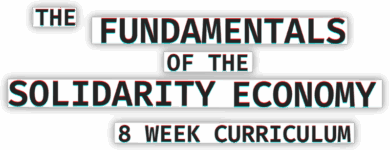Session 3 Resources
Building Food Revolutions

This delectable session will have you hungering for radical transformation! Let’s dive into the complexity of the capitalist food system, particularly its deep connections to other injustices including migrant labour, climate change, and the alienation we feel to our food practices. Learn how to ground a food movement by prioritizing the environment and community needs through real life examples and discussion.
Learning Outcomes
- An understanding of the intricacies of the capitalist food system, and the direction we’re headed if we stay business-as-usual
- Examples of on-the-ground community efforts to localize production, with ways you can get involved
Read
Do Foodies Need to Understand Capitalism?
How have capitalism and our food system come to be so intertwined? Eric Holt-Giménez explains the link between capitalism and food, and why we need to know all this in this introduction.
Explore
Concordia’s Food System
A snapshot of food groups working on Concordia’s campus to help close production loops.
Explore
The Diverse Economy Tool
This tool from Gibson-Graham’s, Take Back the Economy (2013) will be referenced during the session.
Explore
Justicia 4 Migrant Workers
J4MW is a political collective bringing together migrant workers, students, educators, researchers, and racialized youth in Toronto, to advocate for the rights of migrant farm workers.
Read
What is Food Value Chain Coordination?
Food Value Chain Coordination helps build relationships between all of these areas, between the people who work these various roles, into a holistic framework encompassing all of these elements and more.
Watch
Food Co-Op vs. Grocery Store: What's the Difference?
Instead of being governed by shareholders looking for a profit, food co-operatives are run by their own shoppers. This creates a store that can better serve its surrounding community.
Watch
Migrant Dreams (2016)
This documentary film from Min Sook Lee spotlights the Temporary Migrant Worker Program in Canada, and the threat it poses to health, humanity and the dignity of foreign migrant workers.
Read
The Transformative Power of Urban Recipe’s Atlanta Food Co-op Model
Members don’t just receive food; they gain a voice, a role, and a support network. This
approach challenges the traditional food charity model and offers a blueprint for building stronger, more resilient communities grounded in cooperation and shared responsibility.
Watch
Doughnut Economics
Kate Raworth came up with the concept of “Doughnut Economics” - a way to prioritize
human need while also keeping the world’s decision makers accountable with a new method of goal setting.
Read
How co-ops are transforming Quebec’s food deserts
This case study reviews how organizers in the Baie-Johan-Beetz region have coordinated food security in their region through food coops!
Explore
CultivAction Solidarity Co-op
An urban farm on Loyola campus. Check them out!
Explore
Protec-Terre
Protec-Terre's mission is to preserve the environment and living environments by supporting communities in the creation of agroecological social utility trusts (FUSA).
Book Rec
Who Really Feeds the World? (Vandana Shiva)
Book Rec
Harvesting Freedom: The Life of a Migrant Worker in Canada (Gabriel Allahdua and Ed Dunsworth)
Contact:
Hannah Ostiguy Hopp
programs@solidarityeconomy.ca

